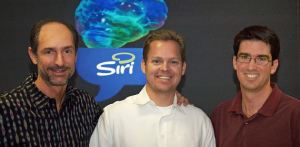Adam Cheyer Discusses the Origins of Siri

What does it take to create a world-changing, disruptive technical innovation? The history and technology behind Siri, the world’s first intelligent computer assistant, is described here by Adam Cheyer, one of the founders of Siri, the SRI company bought by Steve Jobs for use on the iPhone-4. Siri added tens of billions of dollars of market value to Apple and profoundly changed the way the world thinks about interacting with computers.
The other founders of Siri were CEO Dag Kittlaus and Tom Gruber at Siri and Bill Mark and Norman Winarsky at SRI. The founding venture capitalists were Gary Morgenthaler (Morgenthaler Ventures), Shawn Carolin (Menlo Ventures), and Norman Winarsky (VP of SRI Ventures and Licensing). They are seen here discussing Siri with Robert Scoble.

Siri took many years to develop. Adam goes back in time almost two decades. A critical point was when DARPA, under Tony Tether, created the CALO (Cognitive Assistant the Learns and Organizes) project under Bill Mark and Ray Perrault at SRI and Dave Gunning at DARPA. Siri was a result of almost $100 million of R&D with the best partners from across the United States.

What Adam did not discuss in the video is how Bill Mark and Norman Winarsky incubated and built Siri over 5 years before it was spun out of SRI as a new company. They were the original founders of Siri. As you will see from Adam’s talk, SRI had the technology and a working hypothesis for the project years earlier. What Siri didn’t initially have was a business model. It took over three years to develop both a compelling hypothesis for the product and the business model. Only then did Norman hire Dag as CEO, who was a world-leader in that specific market ecosystem. Norman, Bill, Dag, and Adam then spent another year at SRI removing risk from the product and business model before Siri was spun out.
Companies are often started in Silicon Valley before a compelling hypothesis for the business model is established. That is not smart. In this case all the fundamentals were followed: a huge, growing, market opportunity; strong working hypotheses for both a pain-killing product and a business model; a family of barriers to entry by competitors; the best team and partners; and the use of innovation best practices.
Below is an early version of Siri’s NABC value proposition. At this point, as expected, every member of the team had a different version of the value proposition, but this version captures the main ideas. Note that at this stage most of what is needed for a business plan is missing. But these core ideas started the conversation and then, as we validated the assumptions implied, it turned into a full venture presentation with all the business plan questions answered. The name HAL was dropped immediately. It was fun but not at all the purpose of Siri or the image we wanted to project! As shown, the key insight was eliminating clicks. The key risk was not the technology for SRI, it was whether reference fees could be obtained for the services that were located by Siri to support the business model. It took several years to figure that out.
When Jobs bought Siri he made Siri into a generalized search engine with no reference fees. Initially its strength was often entertainment. Siri had initially addressed a limited “beachhead” market segment, business travelers. Making Siri a generalized search engine is a profoundly harder problem. Siri and the other computer assistants still have a long way to go before the bigger opportunity is realized.
- Audience: Silicon Valley VC
- Hook: In the movie 2001, HAL was a computer personal assistant. We have developed a friendly version of HAL for your mobile phone, which I would like to tell you about.
- Need
- Mobile access to services is a multi-billion-dollar opportunity growing at 30% per year
- Keyword search is time consuming and ineffective, particularly on mobile devices
- Each “click” to find an application drops out 20% of users: after 3 to 5 clicks most services and applications are effectively “lost”
- Approach
- We have developed a computer personal assistant, analogous to HAL
- Users in English (and eventually other languages) can find and deliver information and services via speech with their mobile device
- HAL’s beachhead market is access to basic services for business travellers: eventually it will address the much larger market for all consumers
- The business model is reference fees from service providers
- A prototype is developed and the first commercial product will be delivered within 12 months for $5M
- HAL has an outstanding team: CEO Kittlaus, former head of Motorola’s X-Team, and CTO Cheyer, former CTO of the $100M CALO project for DARPA
- Benefits/costs
- Free app to users
- Satisfies user’s needs for basic services and completes the transactions: “Find the status of United 278” or “Get a hotel room for me tonight”
- 10-time speed advantage
- Service providers, like hotels and restaurants, get additional customers for modest charges (~$10 plus)
- A multi-billion-dollar global opportunity with powerful network effects
- HAL learns from the user, increasing accuracy over time (e.g., a person’s preference for Marriott hotels)
- Competition
- World’s first true computer personal assistant with a scalable business model
- Replaces the computer mouse and keyword search
- 2 to 10X better interface compared to mobile Google and Bing
- Strong IP position: result of years of SRI AI research with well over $100M invested
- Close: Can I set up a meeting with you for this Friday at 9AM?